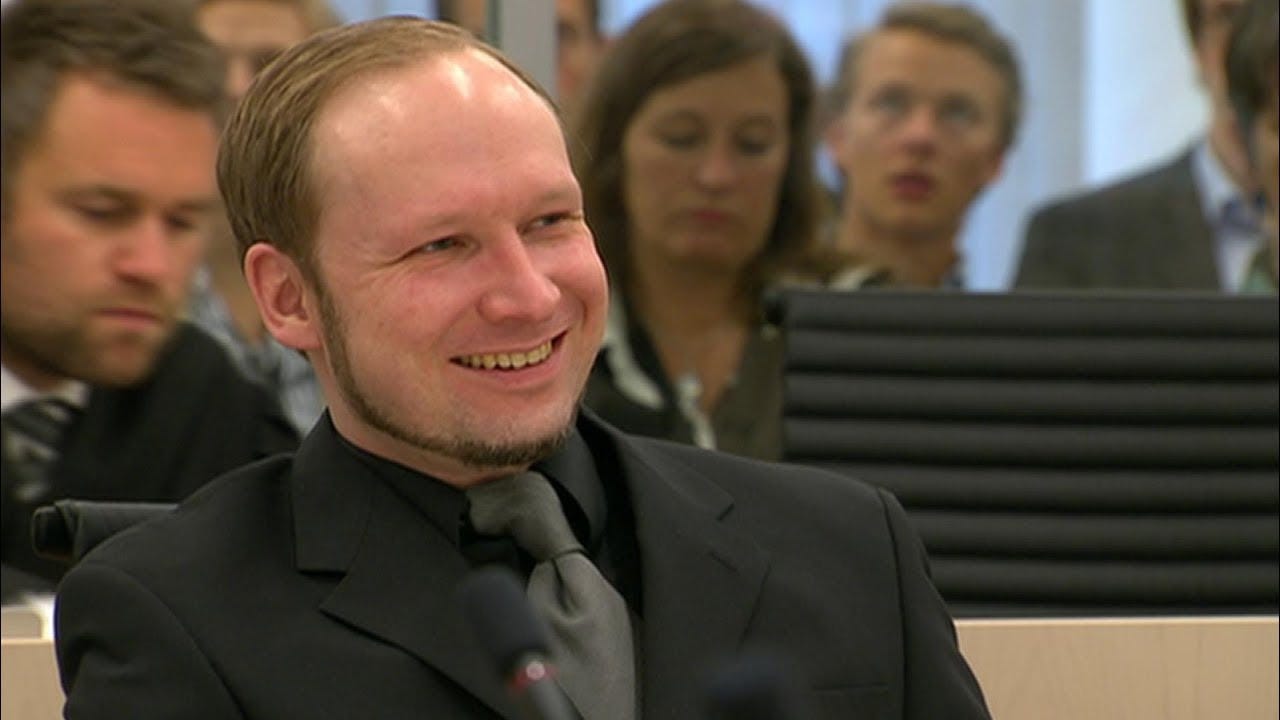Rethinking Death Penalty, or Why Nearly All Criminals Should Be Executed
A German businessman has just been sentenced to five and a half years jail in Singapore for promoting overseas child sex tours in the Philippines - caught by undercover policemen who posed as potential participants. This revolting case - surely merely a tip of the international pedophilia iceberg - has prompted me to take on the topic I have for long considered for publishing - the underutilization of death penalty in removal of harmful people from our societies.
The Folly of Human Rights
Unfortunately, the discussion on dealing with crime has been dominated by the highly individualistic - and idealistic - perspective of the Western world, which emphasizes measured treatment of each individual case, perpetrator and victim, rather than the collective good of the society.
And since the West has influenced the development of the world in the past few hundred years, it is by its idealistic notions that meting out justice globally is now overwhelmingly being evaluated. Given the economic and political importance of Europe and America, even countries like China cannot escape external pressures as they are trying to build a globally acceptable image.
This Western idealism has been enshrined in an increasingly questionable concept of universal human rights - the notion that every person is entitled to certain inalienable rights and treatment, regardless of how they themselves have treated others.
Unfortunately, however well-intentioned the idea of human rights may be, it often proves, paradoxically, to protect criminals from harm.
It has resulted in creating an absurd reality in which murderers, rapists or pedophiles can be sure of particular standards of treatment even as they themselves have denied humaneness to victims of their crimes.
In other words, in many cases criminals face a threat no worse - often much lighter - than their victims, who end up dead, mutilated or face dealing with lifelong trauma.
In abolitionist Europe even murderers know well that whatever happens they will not be sentenced to death and may, in the worst case scenario, serve a life sentence at the expense of the taxpayers - often in fairly comfortable conditions.
One especially egregious example of this blind idealism going absolutely off the rails is the case of Anders Breivik, who shot nearly 80 people at a summer camp of the Norwegian Labour party in 2011. He is now serving a 21 year prison sentence (which may be extended if he is still deemed a threat) in very nearly hotel-like conditions, with three rooms, access to amenities such as TV, computer or gym, all paid by the taxpayers - including the families of people he cold-bloodedly murdered.
But the absurdity doesn't even end there as this vile creature has actually won a case against the Norwegian state (!), for allegedly inhumane isolation that he had claimed to have been put under - a ruling which was only later overturned by the court of appeals and Norwegian Supreme Court. As if that wasn't enough, he has publicly complained - in letters to prison service and the media - about pretty much everything, including the outdated Playstation 2, which he demanded to be replaced with the newer Playstation 3.
Can anybody genuinely find a justice system which allows even mass-murderers to behave in such a way reassuring?
Who needs murderers?
I know this entire article may be highly controversial for many, so why not ask yourselves a pretty reasonable question - who needs people who murder others? What is the benefit that any society could derive from their existence?
Everybody should be afforded due process, of course - there need to be certain legal procedures setting specific boundaries on legal action, to ensure a fair trial. But after the verdict is reached, what's the purpose of keeping these individuals alive on taxpayers' tab for many years or decades? What's the purpose of feeding them, building prisons and employing thousands of people, at a cost of billions of dollars which could definitely be used for something more productive?
Who needs rapists and pedophiles?
For similar reasons I don't quite understand why rape or pedophilia are generally met with much more lenient sentencing. The idea that death is somehow too big of a punishment sounds pretty ridiculous, considering that the act of sexual abuse leaves lifelong scars in people, often condemning them to suffering, social maladjustment, depression or even suicide.
My mother was lucky to have escaped an attempted rape and yet, even 50 years after the event, she is still cautious. She doesn't like returning home after dark - what means for many months during the year she avoids leaving the house after 4 or 5pm. She was saved by other people and spared physical harm but even despite her luck, it has still left a deep mark.
Effectively, then, rape or other sexual abuse is often a life sentence for the victim, while the perpetrator can hope to walk a free man within 5-10-15 years, occasionally more. How can this be deemed just? And why should the society need him back anyway?
It is especially egregious when it concerns minors. Abuse of women, while inexcusable and deeply harmful, can at the very least be rationalized by violent, testosterone-fueled, animal side of male nature.
But what sort of a person takes advantage of a child?
Let's take another look and the sleazy German pedophile jailed in Singapore. While he wasn't found guilty of actually directly abusing any child and was sent to prison for attempting to organize a pedophile trip to the Philippines, the echo of the same question keeps ringing - why do we need him among us?
5.5 years is not a long period of time. He may actually be released earlier, as is often the case. But let's think about the magnitude of the crime - solicitation of minors for foreign pedophiles, surely leading to irrepairable harm done to the children - for their entire lives.
Does it really matter if he has ever taken direct part in the act itself if he wanted to facilitate this abuse of innocent Filipino kids?
These pedo-tours take place because of people like him, There is not a single reason to defend his existence among the rest of mankind. There is absolutely no rational argument to keep him as a burden for the society, which is now going to pay thousands of dollars every year to keep him alive and isolated behind bars.
This money would be far better used to provide material help to potential or past victims of pedophiles like him - while his place is in a crematorium.
Who needs organized crime?
Another category of villains we certainly don't need around us are gangsters of various ilk. If you participate in organized crime you have effectively deliberately conspired against the society. So why should this society accept your existence (and the harm you cause) within its ranks?
If you engage in extortion, harassment, murder, theft, smuggling - what's the use for honest members of the nation to spare your life once you're caught?
We should redefine the society as a membership club - either you're in and you follow the rules - or you're expelled and lose all your privileges.
This notion that every human being is entitled to a certain basic level of treatment - and under no circumstances should be executed, regardless of what his crimes are (as the "progressive" abolitionists preach) is not just idiotic - it's insane.
Who needs thieves, muggers, robbers or scamsters?
I don't see any reason why death penalty should not be an option for property crimes as well. It doesn't have to be mandatory, of course, and up for the judgment of the court - but it should always remain a possibility.
There are two reasons why:
Existing penalty structure defines a certain maximum risk that each crime carries. The lower it is, the greater the chance more people are going to accept it. After all, not everybody gets caught and those who do can spend at worst a few years in jail. In the meantime, the pay off can be big enough to encourage taking a chance.
Secondly, there's no reason for any society to suggest that some crimes are more acceptable than others - as evidenced by the "price" the criminal has to pay for each one. Since we do not want any crime around us, the ultimate price for any of them should be the perpetrator's life - the best way to ensure he won't commit any crime again.
But there's one more reason to consider - and that is that property crimes are really crimes against a person's life as well.
What is money, really? Money is the fruit of your labor - of your time and effort spent gaining particular skills and then spending years on the job to save up and accumulate whatever you can.
In other words, money is a tangible representation of your life - those hours, days, years spent doing something - that somebody now wants to rob you of.
So when you have you car stolen or someone cons you into giving them $10,000 or $100,000 this may be, in effect, years of your life that they have taken from you. Years of work, years of savings, years of accomplishments that have now been obliterated.
It's not just things that you're losing with theft - you're quite literally losing parts of your own life.
These days you're not even safe sitting at home because criminals can still attempt to rob you using your own digital devices - like phones or computers - sending messages, looking to exploit human naivety.
And what is the greatest risk they are facing for trying to rob thousands of people of parts of their lives, cumulatively amounting to thousands of human lifespans? A few years in prison, maybe - with the ultimate sentence often reduced for good behavior.
Let's do a little thought experiment - let's assume an average person could save up about $10,000 per year and we're professionally active for about 40 years, between about 20 and 60. So a theft of $400,000 is effectively a theft of an entire professional lifespan of a single person.
Even in arguably the safest city in the world - Singapore - money lost to scams exceeded $80 million in the first half of 2019. That is approximately 8000 years worth of personal savings robbed by criminals from citizens and companies in the country.
Three Strikes - You're Out
A lot of "progressives" will now wheel out a ton of arguments pointing to how criminals are often victims themselves, that their behavior may be conditioned by poor upbringing, family violence or other social circumstances. Or that some may simply be rebellious and reckless, and surely they deserve a chance for redemption rather than total condemnation.
And I agree that there may be many cases where it is indeed true. But, at the same time, there is no reason why the justice system should not use a spectrum of penalties - from positive attempts at aid and resocialization, through prison sentences all the way to capital punishment.
Thoughtless rejection of the last one as something immoral is absurdly irrational.
There is no reason for the rest of the society to bear the burden of keeping alive people who have abused its members. It's stupidity - and a fundamental weakness that only encourages further breaches of the law.
Yes, some of them may be reckless, young, rebellious - so let's give them a chance. In certain cases, with no permanent damage to any person, the society can afford to give criminals at least one chance to redeem themselves - and even stretch out a helping hand.
First time offenders in property crimes, for example, could be treated more leniently, with counselling, education, job training, advice etc. If, however, despite all this good will, they turn to crime again, there can be no more aid but just a barren cell to have them rethink their sins. And if even that doesn't even help, then the only way to ensure they never re-offend again is to get rid of them.
If someone commits a crime - even a relatively minor one - for the third time, given both a way out and, subsequently, a tough prison lesson, they're not really going to change, are they? So why have them keep doing it?
When you tend your garden you do not leave a separate space for weeds - you rip them out and protect everything else that is beautiful and valuable. So why should any society be concerned with how criminals are treated or whether they are alive at all?
Justice or Safety?
Aversion to capital punishment is merely a reflection of highly subjective Western worldview. The entire notion of "justice" is equally subjective - and, therefore, can be questioned quite freely.
Who is to say what the accurate penalty for e.g. a car theft is? A year in prison? 10 years in prison? It's entirely up to the judges in court - men operating within also man-made boundaries of legislation.
In other words, then, justice itself is also a human invention - and as such it is both fluid and flawed.
The more logical guide should be an objective factor - safety.
Justice is a matter of opinion, safety is a metric.
Crime incidence is entirely quantifiable. Relevant data can be collected and compared across many years to show whether policies in place actually work. The justice system has to measurably serve the society not satisfy cravings of a blind ideology.
Simply put - the ultimate objective is to eradicate crime, as there is absolutely no benefit in allowing it to any degree. The intended incidence rate is zero.
To that end it should be considered irrelevant how the offender is treated and often the only way to make sure he does not re-offend is to kill him. Since criminals don't care about the society why should the society be obliged to care about them?
Let's not forget that incarceration often doesn't solve problems - and creates many new ones, as prisons are a breeding ground for organized crime. Inmates can forge relationships between each other, which later take shape in a form of criminal partnerships after they are released.
Prison sentence should be seen as an act of mercy not a penalty.
We have to remember how expensive keeping crooks behind bars is as well. In the US, the average cost of incarceration is $100 per day per inmate. That is over $36,000 per year that each one is costing the taxpayers.
While I'm not a fan of the idea of tuition "free" tertiary education, you could easily use that money to put a valuable, honest member of the society through college rather than keep a recidivist alive.
Criminals in Service to the Nation
Saving money on keeping evil people alive would already be very beneficial, but there's an even better way that all of them can repay their dues to the society.
Over 100,000 people are on the waiting lists for organ transplants in the US. 20 of them die every day because they have been waiting for too long.
In the meanwhile thousands of robbers, gangsters, murderers, rapists are filling prisons to the brim, while costing billions of dollars.
Deranged human rights ideologues (hard to call them idealists in this context) will rail against the perceived injustice of organ extraction from criminals without their consent - but I think the truly immoral (and deeply irrational) - thing to do is not to save those thousands of lives of honest citizens who hopelessly wait as their time is running out.
One organ donor can save up to 8 lives. Since criminals have no place among us, have caused great harm and their incarceration costs a lot of money which could be used in a far better way, the only rational thing for the society to do is to make use of them in a way that benefits law-abiding taxpayers. Livers, hearts, kidneys, even intestines or eye balls can save lives or help people regain normal existence.
I dare anybody to defend keeping alive (and at the taxpayers' expense) a healthy 40-year old mass murderer like Breivik instead of executing him and dispensing his organs to save a few lives in an attempt to at least slightly balance out the death toll of 77 he claimed in his terrorist attack.
Similarly, can anybody defend the "rights" of pedophiles and rapists, responsible for torment of millions of women and children around the world, scarring them for life? Serial abusers traveling taking advantage of impoverished nations to score virgins on exotic "sex with minors" tours? Or even those who merely enable it - like the German jailed in Singapore?
What sort of a horrifically twisted reality have we created in which honest people watch their loved ones die while millions of criminals have their lives bankrolled by them?
The idea that human life has some inherent value in itself is ridiculous. The value of a human being is determined by his contribution to the common good - of his family, nation and entire mankind. Choosing a path of crime, violence and abuse, one becomes like a cancer cell growing in a healthy organism, consuming it if uncontrolled.
The way to protect it - much like society from crime - is to remove it, before it's too late.








